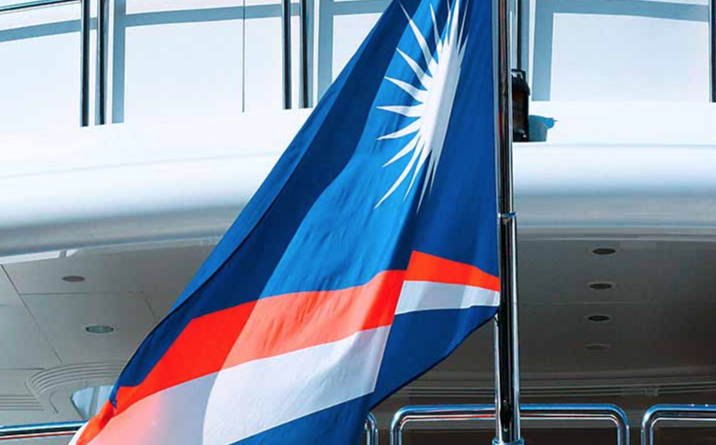Flag and class forging a new digital partnership
DNV GL’s quest to modernise continues to gain momentum…
DNV GL has announced that more key stakeholders are getting on board with its attempt to modernise. A great deal of effort is now being focussed on simplifying and streamlining interactions between flag and class. DNV GL recently met it the Marshall Islands Registry’s management team in London to discuss the potential benefits of digital class for flag states.
“The first role of the flag is to be responsible for ships operating in a safe, secure and environmentally friendly manner,” states John Ramage, chief operating officer of International Registries, Inc. and its affiliates (IRI), which provide administrative and technical support to the Republic of the Marshall Islands (RMI) Maritime and Corporate Registries.
“We have over 400 employees in 28 offices around the world who provide local service. The registry is growing, which means we have to look at how we can maintain good client relations, and digital services will be a big part of solutions for the future.”
The primary role of flag states is to develop regulations and ensure that the ships within their registries are following said regulations. “There are many ways that we do this,” continues Ramage. We visit all the ship in our fleet at least once a year and delegate statutory tasks to DNV GL and other class societies. Class oversight is important in helping us do our jobs.”
Class is seen as a vital resource on technical issues, but flag also bares a great deal of responsibility for understanding the nuances of its fleet and providing technical and operational advice. Each party must understand the other’s skill sets, purpose and language. “We have cultivated a great relationship with DNV GL, and we feel we can carry on a meaningful dialogue towards our shared goal of using digital technology to streamline class and flag processes,” says Simon Bonnet, ITI’s senior vice president, technical.
The benefits of enhanced digital synergies between class and flag are many and varied and include, but are not limited to, supporting both seafarers and employers by automating and simplifying paperwork and providing more data for class and flag state to analyse and improve their services.
Unfortunately, digital class is not yet a universal requirement with a number of Port State Control offices remaining reluctant to accept e-certificates. “IMO would have to mandate their use in order for all stakeholders to comply, but some states simply lack digital infrastructure in all their ports. Until this is resolved, ships will be dependent on paper in those ports,” continues Ramage.
One of the key factors hindering the implementation of electronic certificates is corruption. “It is basically institutionalised in some places, and the transparency of electronic certificates threatens that way of doing business. With electronic certificates, there is nowhere to hide illegal activities, so certain individuals are reluctant to take them into use. Eventually the Maritime Anti-Corruption Network will make all transactions transparent, but there are other challenges as well. We will need to align our formats across the board and ensure the integrity of both data and transactions,” Ramage explains.
Another area that may be greatly benefited by digitisation is an increase in the use of remote surveys rather than sending surveyors to attend vessels. While there is no doubt that on-site surveys will remain a necessity, there are certain codes that can be satisfied remotely, such as changes in freeboard for vessels with multiple load lines, or rectification of a minor CA such as the replacement of a damaged fire hose.
“We are already doing this with remote surveys. DNV GL started with a pilot programme, which is now a full ongoing programme, and the RMI has authorized them to carry out remote surveys for selected owners and vessels,” comments Dave Wamsley, RMI’s principal contact for DNV GL. “Remote surveys have also been authorized for certain statutory surveys, but we have only scratched the surface. Remote and digital services are progressing at a quick pace, and this is also being driven by communication capabilities.
“We foresee this really taking off, covering nearly everything. Major damage and annual surveys will still be manual, but virtually everything else can be done remotely, and it will extend further as the industry gains experience.”
When it comes to the digital shift, Wamsley outlines, there are certain projects that have a greater urgency than others. “I think electronic logbooks are the next in line,” he says. “The present system demands huge time and effort from the officers and it can have expensive repercussions if it is done wrong.”
The shift towards the digitisation of class and flag has an air inevitability about it, but the technology must be developed and understood before it can be implemented in any sort of universal fashion. Ramage ins inclined to agree with those who suggests that autonomous need not necessarily mean unmanned. Digitisation is, in its current format and near-future iterations and enabler not a disruptor, but who knows what the future the holds.
Profile links
Marshall Islands Yacht Registry (International Registries, Inc.)
Click here to become part of The Superyacht Group community, and join us in our mission to make this industry accessible to all, and prosperous for the long-term. We are offering access to the superyacht industry’s most comprehensive and longstanding archive of business-critical information, as well as a comprehensive, real-time superyacht fleet database, for just £10 per month, because we are One Industry with One Mission. Sign up here.




